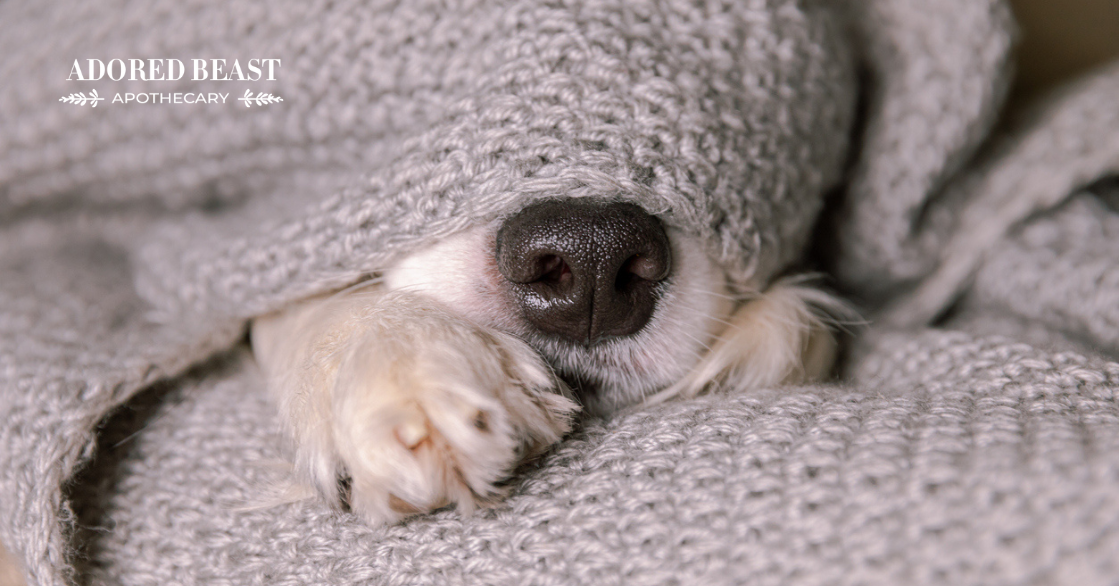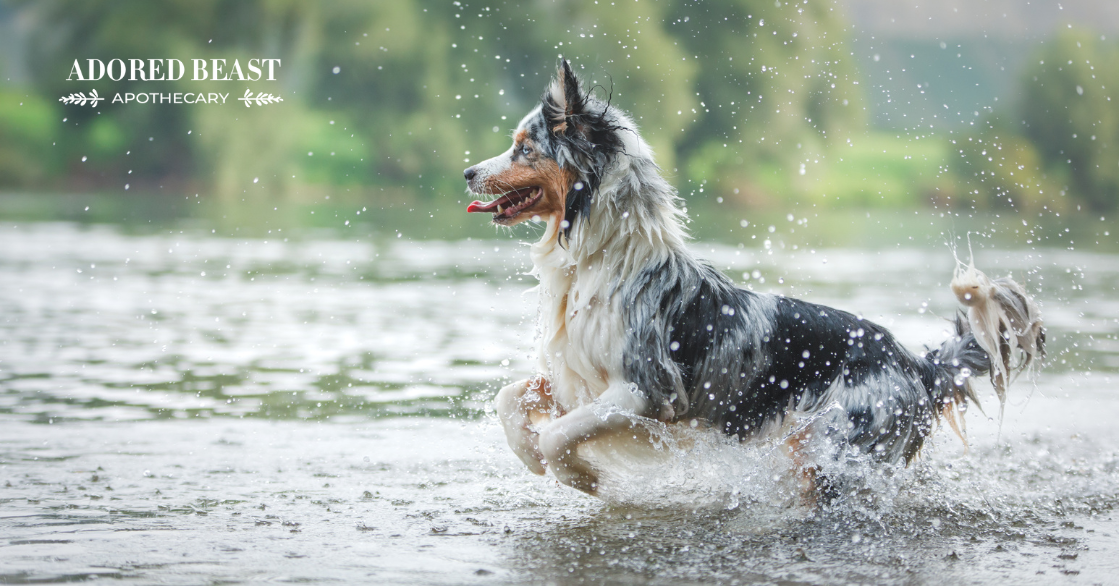Just like us humans, our canine companions can experience anxiety. In fact, anxiety in dogs is more common than you might think. Many pups experience it, for a variety of different reasons and in a variety of situations.
But taking a holistic approach means more than just trying to find a supplement to help keep your pup cool, calm, and collected. It’s about looking at the whole picture, identifying the triggers, and understanding all the things you can do as a pet parent to help bring those anxiety levels down!
So, in this post, let’s discuss natural supplement solutions, stress reduction in the home, and the importance of exercise in alleviating canine anxiety. These all work together to nurture the peace and help get our pups to their happy place.
Types of Anxiety in Dogs
There are lots of different things that can make a pup feel anxious. Typically these things are classified into two groups: behavioural and situational.
- Situational Anxiety – This is when your pup gets anxious about specific things. They might display signs during a thunderstorm, fireworks, or during a car ride.
- Behavioural Anxiety – This is when a pup has ongoing anxiety about something. Separation anxiety is the most common example of this, but past traumas can cause ongoing anxiety, as can a new move or the loss of a beloved friend.
We encourage you to look beyond this, though. Every animal is unique, and there are a lot of different things that can contribute to an animal’s anxiety. Getting to the root is the most critical component to finding the right solution that will meet your individual dog’s needs. Things to consider as far as root causes may include: current or past disease states (seizures, cushing’s, canine cognitive disorder, etc.), pain, past abuse or trauma, allergies, or is it simply who they came into this world being. Having a kinder, gentler understanding of your dog and who they are will help you to better find the right holistic solution.
Signs of Anxiety
Sometimes it can be easy to tell when your dog is anxious, but not always. Sometimes the signs are much more subtle. These are some of the common signs, as well as some that you may not attribute to anxiety:
- Crying or barking
- Hiding away
- Chewing or destructive behaviour
- Restlessness or pacing
- Shaking or trembling
- Panting excessively
- Biting or snapping
- Excessive licking
- Excessive drooling
How Can You Help Your Dog?
We mentioned addressing anxiety holistically, and that means several different things.
1. Natural Supplements
Several conventional medications are commonly prescribed by veterinarians to help manage anxiety in dogs. And for some dogs, if the anxiety seriously impacts quality of life, one of these options might be the only thing that can help a dog.
However, in many cases, there are natural options that will be just what your dog needs.
Here are some of our favourites:
- CBD Oil: Cannabidiol (CBD) has shown promise in reducing anxiety in dogs. A study published in Frontiers in Veterinary Science found that CBD oil can be effective in decreasing stress-related behaviours.
- Chamomile: This herb has calming properties and can be administered in the form of tea or supplements. Research in the Journal of Agricultural Science and Technology highlights chamomile’s potential as an anxiolytic. It’s also great for many other things – find out more here.
- L-Theanine: An amino acid found in green tea, L-Theanine has been shown to promote relaxation without sedation. The Journal of Veterinary Behavior published a study suggesting its efficacy in reducing anxiety.
- Flower Essences: Flower essences are based on vibrational energetics, rather than biochemical, and stimulate the body’s natural capacity to bring itself back to homeostasis. Bach’s Recuse Remedy is our go-to. It features several different remedies perfectly combined to address stress and anxiety.
- Homeopathy: Several different homeopathic remedies can also be helpful in many situations. We reach for aconite (for general fear), phosphorous (particularly useful for noise), or pulsatilla (for separation anxiety).
- Medicinal mushrooms: Reishi, in particular, can be beneficial in blanketing your pup in a state of calm.
- Calming pheromones: Nursing dogs release a special kind of comforting pheromone to let their puppies know they’re safe, and this pheromone, also known as the dog appeasing pheromone (DAP), has been shown to be helpful in calming an anxious dog.
- Pressure/weighted coats & wearables: While not technically a supplement, these can help by giving your dog a sense of peace. Dogs who suffer from anxiety will sometimes feel calmer while wearing a tightly wrapped item, just as a baby immediately calms when it is swaddled.
**Sometimes the best supplement will depend on the root cause of the anxiety. Speaking with your holistic veterinarian or certified expert can be a great way to really tailor the solution to meet your pet wherever they’re at.
2. Reducing Stress in the Home
Creating a calm and soothing environment at home can be crucial for dogs with anxiety, and it can really help when approaching it holistically.
- Consistent Routine: Establishing a predictable daily routine can help your dog feel secure and lower stress levels.
- Safe Spaces: Provide a designated area where your dog can retreat when feeling anxious. This could be a cozy bed (or under one!), a crate, or their own little cave.
- Gentle Interactions: Approach your dog calmly and avoid sudden movements or loud noises, especially for dogs with a history of abuse. And, in this case, be aware of hand movements. The same goes for introducing them to new people or dogs. The name of the game here is slow and graceful.
- Calming Music: Playing soothing music designed for dogs can have a calming effect. In this case, research suggests that classical music is the most calming music for animals.
3. Exercise as a Stress Reliever
Regular physical activity is essential for mental and emotional well-being, and yet another part of the holistic approach to anxiety in dogs.
- Structured Walks: Daily walks provide mental stimulation and an opportunity for your dog to explore the environment. (Make sure you are keeping in mind your dog’s limitations, whether it be physical, mental, or emotional.)
- Interactive Play: Engage in activities that stimulate your dog’s mind, such as puzzle toys or interactive games. (Don’t overdo it if your dog isn’t interested. Work with their needs and likes.)
- Regular Exercise Routine: Establish a consistent exercise routine to burn off excess energy and promote a sense of calm. Think about it as walking off the nervous energy, especially before an anxiety-triggering event. That said, you can also “walk it off” afterwards if you can’t catch it before hand, or even sometimes both will be helpful for certain animals and in certain situations.
Supporting a dog with anxiety requires a holistic approach that addresses both the physical and emotional aspects of their well-being. Natural supplements, stress reduction at home, and regular exercise can all contribute to a more balanced and relaxed state of mind for your beloved canine companion. And remember, every dog is different. Some are blessed to never have any anxiety, while others just have a harder time dealing with certain situations. We need to support them the best ways we can: being patient, providing love, and boosting their well-being every day in every way possible.












